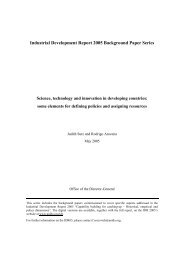Manual on the Development of Cleaner Production Policies ... - Unido
Manual on the Development of Cleaner Production Policies ... - Unido
Manual on the Development of Cleaner Production Policies ... - Unido
You also want an ePaper? Increase the reach of your titles
YUMPU automatically turns print PDFs into web optimized ePapers that Google loves.
DEVELOPMENT OF CP POLICY<br />
MODULE 2: BASICS OF CP POLICY<br />
EXERCISE<br />
Keeping in mind <strong>the</strong> benefits listed above, participants could discuss <strong>the</strong> objectives and benefits <strong>of</strong><br />
introducing a nati<strong>on</strong>wide CP policy in <strong>the</strong>ir respective countries. Answers should be listed <strong>on</strong> a<br />
flipchart and at <strong>the</strong> end <strong>of</strong> <strong>the</strong> exercise participants should rank <strong>the</strong> benefits in order <strong>of</strong> importance.<br />
The results could be retained for reference in <strong>the</strong> following module.<br />
SLIDE: Policy integrati<strong>on</strong><br />
Policy integrati<strong>on</strong> means ensuring that <strong>the</strong> CP policy being developed<br />
harm<strong>on</strong>izes with <strong>the</strong> objectives <strong>of</strong> various sectors <strong>of</strong> <strong>the</strong> ec<strong>on</strong>omy, and that<br />
CP is promoted within sectoral policies (known as mainstreaming). This<br />
requires:<br />
• Good analysis <strong>of</strong> existing sectoral policies<br />
• Inter-instituti<strong>on</strong>al and intersectoral effort<br />
• Str<strong>on</strong>g leadership and broad support for CP<br />
The integrati<strong>on</strong> <strong>of</strong> CP with o<strong>the</strong>r sectoral policies (mainstreaming) is necessary<br />
if <strong>the</strong> c<strong>on</strong>cept <strong>of</strong> <strong>Cleaner</strong> Producti<strong>on</strong> is to enjoy wide applicati<strong>on</strong>. This slide<br />
explains <strong>the</strong> c<strong>on</strong>cept <strong>of</strong> policy integrati<strong>on</strong>, why it is crucial to CP promoti<strong>on</strong> and<br />
what factors are necessary to achieve successful integrati<strong>on</strong>.<br />
Background<br />
<strong>Cleaner</strong> producti<strong>on</strong> programmes are likely to be more effective when <strong>the</strong>re is a legislative framework<br />
for envir<strong>on</strong>mental protecti<strong>on</strong>, regulati<strong>on</strong> and enforcement in place to support CP. Envir<strong>on</strong>mental<br />
policies should take into account ec<strong>on</strong>omic and envir<strong>on</strong>mental realities, and a cleaner producti<strong>on</strong><br />
policy must also reflect <strong>the</strong> needs and priorities identified in existing sectoral policies.<br />
Efforts should be taken to build <strong>the</strong> c<strong>on</strong>cept <strong>of</strong> <strong>Cleaner</strong> Producti<strong>on</strong> into <strong>the</strong> highest level envir<strong>on</strong>mental<br />
and o<strong>the</strong>r sector-specific policy documents. Preventi<strong>on</strong> must be emphasized as <strong>the</strong> major principle <strong>of</strong><br />
envir<strong>on</strong>mental protecti<strong>on</strong>. CP and preventive approaches should be included in <strong>the</strong> development <strong>of</strong><br />
new sectoral policies. This is referred to as mainstreaming CP. Mainstreaming CP does not simply<br />
imply making a few provisi<strong>on</strong>s (tax rebates, permitting provisi<strong>on</strong>s, etc.) in <strong>the</strong> existing system. Nor<br />
does it mean enacting a brand new, stand-al<strong>on</strong>e <strong>Cleaner</strong> Producti<strong>on</strong> act. It requires including <strong>the</strong><br />
c<strong>on</strong>cept <strong>of</strong> preventive strategies in all aspects <strong>of</strong> <strong>the</strong> governmental policy framework to make it<br />
uniformly supportive and favourable to <strong>Cleaner</strong> Producti<strong>on</strong>.<br />
Similarly, <strong>the</strong>re is a need for policy integrati<strong>on</strong>, which means ensuring that a CP policy is harm<strong>on</strong>ized<br />
or c<strong>on</strong>sistent with <strong>the</strong> various o<strong>the</strong>r policies in force or under development. The distorting effects <strong>of</strong> an<br />
incoherent policy framework can make <strong>Cleaner</strong> Producti<strong>on</strong> less effective. For instance, energy or<br />
water subsidies, <strong>the</strong> protecti<strong>on</strong> <strong>of</strong> certain industrial sectors from competiti<strong>on</strong>, or fragmented and<br />
piecemeal sectoral policies all have a negative effect <strong>on</strong> <strong>the</strong> implementati<strong>on</strong> <strong>of</strong> CP. Insufficient data<br />
and informati<strong>on</strong> systems are also a str<strong>on</strong>g impediment to <strong>the</strong> identificati<strong>on</strong> <strong>of</strong> priority regi<strong>on</strong>s or<br />
industrial sectors for acti<strong>on</strong>, <strong>the</strong> formulati<strong>on</strong> <strong>of</strong> l<strong>on</strong>g-term plans and programmes to reduce polluti<strong>on</strong> as<br />
well as to <strong>the</strong> m<strong>on</strong>itoring <strong>of</strong> <strong>the</strong> impact and sustainability <strong>of</strong> efforts. Policy integrati<strong>on</strong> can occur both<br />
within <strong>the</strong> c<strong>on</strong>text <strong>of</strong> <strong>the</strong> price mechanism (market-based), or at <strong>the</strong> instituti<strong>on</strong>al level (governmentbased).<br />
PAGE 37
















